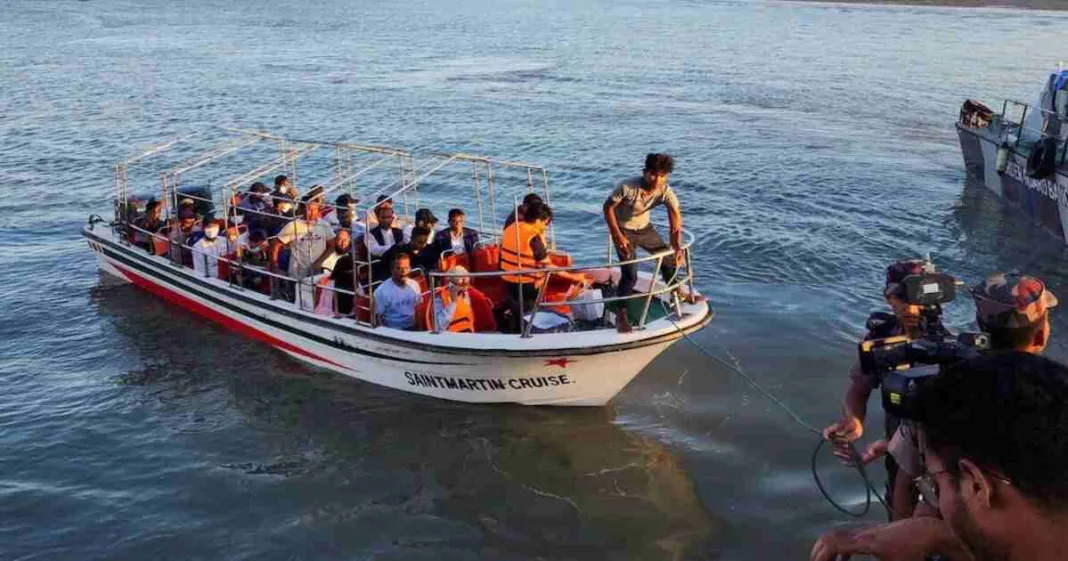The plight of the Rohingya, one of the most persecuted minorities in the world, resurfaced on global radars this weekend as over 110 refugees were rescued off the coast of Indonesia’s Aceh province. This latest arrival sheds light on the dire conditions faced by the Rohingya and the political complexities that exacerbate their suffering. The refugees’ journey from Myanmar to Indonesia represents a microcosm of systemic persecution, international indifference, and a humanitarian crisis that demands urgent attention.
A Harrowing Rescue in Aceh
On Saturday, 116 Rohingya refugees, primarily women and children, arrived in East Aceh’s Birem Bayeun district after their boat nearly sank. Fishermen in the area, witnessing the vessel in distress, intervened to save the passengers from drowning. According to Syamsul Bahri, an East Aceh government official, the boat sustained severe damage and was found half-submerged just 100 meters from the shoreline.
UNHCR representative Faisal Rahman confirmed the survivors were stranded on the beach, awaiting decisions on relocation. Despite their fortunate rescue, one refugee required immediate medical treatment, highlighting the physical toll of the treacherous journey. For these Rohingya, escaping systemic oppression in Myanmar often means risking death at sea, where their flimsy vessels are at the mercy of the elements.
Persecution in Myanmar: Roots of the Crisis
The Rohingya, a predominantly Muslim ethnic group, have long faced institutionalized discrimination in Myanmar, where they are denied citizenship and labeled as “illegal immigrants” despite tracing their lineage in the region back centuries. Subjected to restrictions on movement, marriage, and education, the Rohingya endure what many international organizations, including the United Nations, have labeled as ethnic cleansing or even genocide.
Read More: Digital Authoritarianism in Pakistan: A China-Style Firewall to Suppress Dissent
The most significant exodus occurred in 2017, when Myanmar’s military launched a brutal campaign against the Rohingya, purportedly in response to militant attacks. The campaign resulted in mass killings, rapes, and the destruction of villages. Nearly 700,000 Rohingya fled to neighboring Bangladesh, joining hundreds of thousands already displaced in makeshift camps in Cox’s Bazar, which now constitutes the world’s largest refugee settlement.
The Perils of the Sea and Indonesia’s Response
Indonesia has become a frequent destination for Rohingya refugees fleeing Myanmar and overcrowded camps in Bangladesh. Their journeys often occur between October and April, when calmer seas offer a marginally safer passage. However, this year alone, over 2,000 Rohingya have reached Indonesia, marking a dramatic increase compared to previous years.
While Indonesia has displayed moments of compassion, rescuing refugees from stranded vessels and providing aid, its broader policy stance reflects reluctance. Not a signatory to the UN Refugee Convention, Indonesia asserts that it lacks the capacity to absorb refugees. Local hostility towards Rohingya arrivals is growing, fueled by frustrations over perceived burdens on resources. The government has called for regional cooperation, urging nations like Malaysia and Thailand to share the responsibility. However, such calls often fall on deaf ears, leaving the refugees in limbo.
Regional Politics and International Apathy
The Rohingya crisis underscores Southeast Asia’s fragmented response to forced migration. Countries like Malaysia and Thailand, though geographically closer to Myanmar, have shown limited willingness to accept refugees. Meanwhile, Bangladesh, already hosting over a million Rohingya, struggles with resource constraints and political challenges.
Internationally, efforts to hold Myanmar accountable have faltered. Despite mounting evidence of human rights abuses, including a United Nations fact-finding mission that accused Myanmar of “genocidal intent,” concrete action has been limited. The International Court of Justice (ICJ) is currently hearing a genocide case against Myanmar, but proceedings are slow, and outcomes uncertain.
Even democratic leaders like Aung San Suu Kyi, once lauded as a global icon for human rights, have failed the Rohingya. Suu Kyi, during her tenure as Myanmar’s de facto leader, defended the military’s actions on international platforms, prioritizing domestic political stability over the Rohingya’s survival.
Humanitarian Challenges and the Path Forward
As Rohingya refugees continue to arrive in Indonesia, questions loom about their future. Local authorities and international agencies, including UNHCR, are providing immediate aid, but long-term solutions remain elusive. Statelessness further complicates their plight; without legal recognition, the Rohingya are denied fundamental rights, perpetuating cycles of poverty and vulnerability.
Addressing the crisis requires a multifaceted approach. First, regional cooperation must improve. ASEAN countries, alongside global powers, need to create equitable mechanisms for sharing the refugee burden. Second, Myanmar must face sustained international pressure to ensure accountability for its actions and grant citizenship to the Rohingya. Lastly, the global community must fund and support refugee resettlement initiatives, offering the Rohingya a chance to rebuild their lives.
The rescue of 116 Rohingya refugees in Indonesia is a sobering reminder of a crisis that remains unresolved. These men, women, and children risk their lives for a semblance of safety, fleeing persecution that has endured for decades. Their plight is not just a humanitarian tragedy but a political failure that demands urgent global attention. Without coordinated action, the Rohingya will remain stateless and marginalized, perpetually caught between the violence they flee and the indifference they face.














